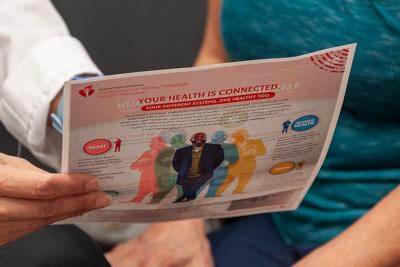Key Takeaways
Most adults haven’t heard of CKM syndrome, even though 9 in 10 are affected by it
The syndrome represents health problems in the system that includes the heart, kidneys and metabolism
Only 12% of people have heard of CKM syndrome
TUESDAY, Oct. 21, 2025 (HealthDay News) — It’s one of the deadliest syndromes you’ve never heard of, but experts are hoping to change that.
Nearly 9 of 10 Americans have not heard of cardiovascular-kidney-metabolic (CKM) syndrome, even though about the same proportion are affected by it, according to a new survey by the American Heart Association (AHA).
CKM syndrome represents a cluster of health problems occurring in one of the body’s most essential “full circle systems,” experts said. It includes heart disease, kidney disease, diabetes and obesity.
“The heart, kidney and metabolic systems are connected and, as such, should be treated in a coordinated way,” Dr. Eduardo Sanchez, the AHA’s chief medical officer for prevention, said in a news release. "These results reveal the need to emphasize those connections and help patients understand the importance of collaborative care.”
Nearly 90% of U.S. adults have at least one risk factor for CKM, which was defined by the AHA in 2023.
These risk factors include high blood pressure, abnormal cholesterol, high blood sugar, excess weight and reduced kidney function, the AHA says. The interplay of these factors can increase a person’s risk of heart attack, stroke and heart failure more than any one of them alone.
CKM syndrome affect the complex system that fuels the body:
The heart pumps blood throughout the body.
The metabolic system burns blood sugar for energy.
Waste from blood sugar metabolism dumps back into the blood.
The kidneys filter that waste and balance fluids, which helps with blood pressure.
Blood pressure affects how the heart pumps blood.
“It’s a full circle,” Sanchez said. “You can take care of your overall health with regular checks of your blood pressure, cholesterol, weight, blood sugar and kidney function.”
For most people, CKM syndrome is reversible with medication and changes to their lifestyle like eating healthier and getting more exercise, experts said.
But word hasn’t yet gotten out about CKM syndrome, as the new survey found that only 12% of U.S. adults have heard of it.
There also were some powerful misperceptions associated with the syndrome.
For example, 42% of those surveyed believed that a healthy heart wouldn’t likely be damaged by illnesses affecting other organ systems, or they weren’t sure.
And 68% incorrectly believed that it’s best to manage individual conditions one at a time, or weren’t sure of the best way to manage them.
However, people also seemed interested in learning more about CKM syndrome.
Four in five (79%) said it’s important to understand CKM health, and 72% said they’re interested in learning more about it.
Most were interested in learning how CKM syndrome is treated (72%) and diagnosed (71%).
“We want people to know that it’s really common to have heart, kidney and metabolic risk factors at the same time,” Sanchez said. “It is reassuring that once the CKM connection was defined nearly three-quarters of those responding understood that it was important and wanted to learn more.”
The AHA plans to issue its first-ever guidelines on CKM syndrome in early 2026.
The online survey was conducted in August 2025 among 4,007 adults. The margin of error is plus or minus 2 percentage points.
More information
The American Heart Association has more on CKM Syndrome.
SOURCE: American Heart Association, news release, Oct. 20, 2025
What This Means For You
People with any of the health problems associated with CKM syndrome should ask their doctor about the best treatments and lifestyle changes for their condition.





















(0) comments
Welcome to the discussion.
Log In
Keep it Clean. Please avoid obscene, vulgar, lewd, racist or sexually-oriented language.
PLEASE TURN OFF YOUR CAPS LOCK.
Don't Threaten. Threats of harming another person will not be tolerated.
Be Truthful. Don't knowingly lie about anyone or anything.
Be Nice. No racism, sexism or any sort of -ism that is degrading to another person.
Be Proactive. Use the 'Report' link on each comment to let us know of abusive posts.
Share with Us. We'd love to hear eyewitness accounts, the history behind an article.